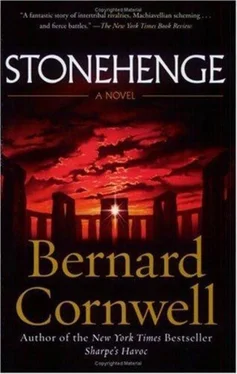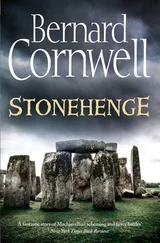The chief fished in a pouch that hung from his belt and took out the small lozenge that Saban had brought from the Old Temple. He dropped the scrap of gold onto the cloak. 'Now put the rest there,' he said to Lengar.
'The gold is mine!' Lengar insisted, and this time only Ralla, his mother, and Jegar, one of his closest friends, shouted their support. Jegar was a small and wiry man, the same age as Lengar, but already one of the tribe's greatest warriors. He killed in battle with an abandon that was equal to Lengar's own and he was avid for a fight now, but none of Lengar's other hunting companions had the belly to confront Hengall. They were relying on Lengar to win the confrontation and it seemed he would do that by violence for he suddenly raised his spear, but instead of stabbing with the blade he held it high in the air to draw attention to his words. 'I found the gold! I killed for the gold! The gold came to me! And is it now to be hidden in my father's hut? Is it to gather dust there?' Those words provoked sympathetic murmurs for many in Ratharryn resented the way Hengall hoarded treasures. In Drewenna or Cathallo the chief displayed his wealth, he rewarded his warriors with bronze, he hung his women with shining metal and he made great temples, but Hengall stored Ratharryn's wealth in his hut.
'What would you do with the gold?' Galeth intervened. He was standing now, and he had untied his tail of hair which hung black and ragged about his face so that he looked like a warrior on the edge of battle. His spear blade was levelled. 'Tell us, nephew,' he challenged Lengar, 'what will you do with the gold?'
Jegar hefted his spear to meet Galeth's challenge, but Lengar pushed his friend's blade down. 'With this gold,' he shouted, patting the lozenges on his chest, 'we should raise warriors, spearmen, archers, and end Cathallo for ever!' Now the voices that had first supported him shouted again, for there were many in Ratharryn who feared Cathallo's growth. Only the previous summer the warriors of Cathallo had taken the settlement of Maden that lay between Ratharryn and Cathallo, and hardly a week passed without Cathallo's warriors scouring Hengall's land for cattle or pigs, and many in the tribe resented that Hengall appeared to be doing nothing to stop the taunting raids. 'There was a time when Cathallo paid us tribute!' Lengar shouted, encouraged by the crowd's support. 'When their women came to dance at our temples! Now we cower whenever a warrior of Cathallo comes near! We grovel to that foul bitch, Sannas! And the gold and the bronze and the amber that could free us, where is it? And where will this gold go if I give it up? There!' With that last word he turned and pointed the spear at his father. 'And what will Hengall do with the gold?' Lengar asked. 'He will bury it! Gold for the moles! Metal for the worms! Treasure for the grubs! We scratch for flint and all the while we have gold!'
Hengall shook his head sadly. The crowd that had cheered Lengar's last words fell silent and waited for the fight to start. Lengar's men must have thought the moment was close for they summoned their courage and closed up behind their leader with levelled weapons. Jegar was dancing to and fro, his teeth bared and spear blade pointing at Hengall's belly. Galeth edged closer to Hengall, ready to defend his brother, but Hengall waved Galeth away, then turned, stooped and fetched his war mace from where it had been hidden under the low thatch of his hut's eave. The mace was a shaft of oak as thick as a warrior's wrist topped with a misshapen lump of grey stone that could crush a grown man's skull as if it were a wren's egg. Hengall hefted the mace, then nodded at the cloak of bear fur. 'All the treasure, boy,' he said, deliberately insulting his son, 'all of it, in the cloak.'
Lengar stared at him. The spear had a longer reach than the mace, but if his first lunge missed then he knew the stone head would break his skull. So Lengar hesitated, and Jegar pushed past him. Hengall pointed the mace at Jegar. 'I killed your father, boy,' he snarled, 'when he challenged me for the chiefdom, and I crushed his bones and fed his flesh to the pigs, but I kept his jawbone. Hirac!'
The high priest, his skin mottled with dirt and chalk, bobbed at the edge of the crowd.
'You know where the jawbone is hidden?' Hengall demanded.
'I do,' Hirac said.
'Then if this worm does not step back,' Hengall said, staring at Jegar, 'make a curse on his blood. Curdle his loins. Fill his belly with black worms.'
Jegar paused for a heartbeat. Although he did not fear Hengall's mace, he did fear Hirac's curse, so he stepped back. Hengall looked back at his son. 'In the cloak, son,' he said softly, 'and hurry! I want my breakfast!'
Lengar's defiance crumpled. For a second it seemed he would leap at his father, preferring death to dishonour, but then he just sagged and, with a despairing gesture, dropped the spear, unlooped the gold from his neck and cut the stitches holding the great lozenges to his jerkin. He placed all the lozenges in the bear cloak, then unclasped the belt and tossed it with its great gold buckle onto the lozenges. 'I found the gold,' he protested lamely when he had finished.
'You and Saban found it,' Hengall agreed, 'but you found it in the Old Temple, not in the woods, and that means the gold was sent to all of us! And why?' The chief had raised his voice so that all the folk could hear him. The gods have not revealed their purpose, so we must wait to know the answer. But it is Slaol's gold, and he sent it to us, and he must have had a reason.' He hooked the bear cloak with his foot, dragging it and the treasures towards his hut's doorway from where a pair of woman's hands reached out to haul the glittering pile inwards. A faint groan went through the crowd, for they knew it would be a long time before they ever saw that gold again. Hengall ignored the groan. There are those here,' he shouted, 'who would have me lead our warriors against the folk of Cathallo, and there are folk in Cathallo who would like their young men to attack us! Yet not all in Cathallo wish war on us. They know that many of their young men will die, and that even if they win the war they will be weakened by the fight. So there will be no war,' he finished abruptly. That had been a very long speech for Hengall, and a rare one in that he had revealed his thinking. Tell someone your thoughts, he had once said, and you give away your soul, but he was hardly giving away secrets when he declared his abhorrence of war. Hengall the Warrior hated war. The business of life, he liked to say, is to plant grain, not blades. He did not mind leading war bands against Outlanders, for they were strangers and thieves, but he detested fighting against the neighbouring tribes, for they were cousins and they shared Ratharryn's language and Ratharryn's gods. He looked at Lengar. 'Where's the dead Outlander?' he asked.
'In the Old Temple,' Lengar muttered. His tone was surly.
Take a priest,' Hengall instructed Galeth, 'and get rid of the body.' He ducked back into his hut, leaving Lengar defeated and humiliated.
The last of the mists vanished as the sun broke through the thin cloud. The moss-covered thatch steamed gently. The excitement in Ratharryn was over for the moment, though there were still the after-effects of the storm to marvel at. The river flowed above its banks, the great ditch which lay inside the encircling embankment was flooded and the fields of wheat and barley were beaten flat.
And Hengall was still the chief.
—«»—«»—«»—
The vast earthen embankment defined Ratharryn. Folk still marvelled that their ancestors had made such a wall for it stood five times the height of a man and ringed the huts where close to a hundred families lived. The bank had been scraped from soil and chalk with antlers and ox-blades, and was topped by the skulls of oxen, wolves and enemy spearmen to keep away the spirits of the dark forest. Every settlement, even the mean houses up on the higher land, had skulls to frighten the spirits, but Ratharryn mounted its skulls on the great earth bank that also served to deter and awe the tribe's enemies.
Читать дальше
Конец ознакомительного отрывка
Купить книгу












